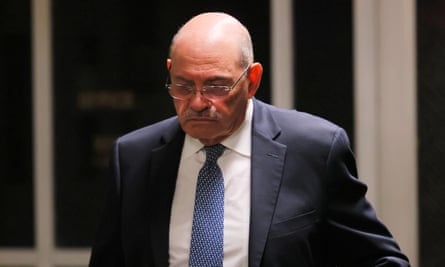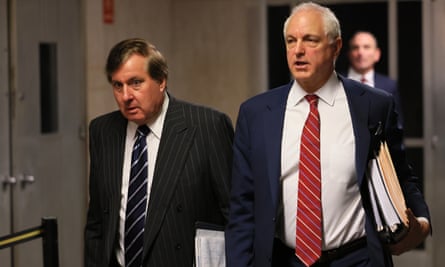Amid all the mammoth legal contests facing Donald Trump, a lawsuit against his family’s company finally came into focus in a New York court last week.
Alan Weisselberg, the longtime Trump Organization treasurer, told jurors he betrayed the Trump family’s trust by dodging $1.7 million in income taxes for corporate benefits including a Manhattan apartment, Grandchildren’s school fees and luxury cars.
Weisselberg’s testimony is at the center of a criminal case accusing Trump Companies and its payroll subsidiary Trump Payroll of tax fraud. Over the summer, the executive, who remains a salaried employee of the company, pleaded guilty to 15 counts of tax fraud and was set to receive a reduced sentence of five months — but only if he was convicted of testifying truthfully in court.
“I believe in the truth,” he told the court on Friday, a day after he collapsed on the witness stand after testifying that “my personal greed led to this.” Asked if he was embarrassed by his actions, Weisselberg said: “More than you think.”
Weisselberg was tasked with satisfying the demands of his plea agreement, but also asserting that he was acting only for himself and not that he was acting “on behalf” of the company, even though he acknowledged on the stand that the company may have benefited from the arrangement.
Weisselberg, who has described himself as Trump’s “eyes and ears,” has been careful not to let his bosses or sons Eric and Donald Trump Jr. know about the fraud. It’s a tightrope walk. On the witness stand Friday, Weisselberg was asked if he had the best lawyer in town. “I hope so,” he replied to jury laughter.
“He said I might be guilty, the company might be guilty, but Trump personally is not guilty,” said former U.S. Attorney Andrew Weissman.
But that didn’t stop prosecutors from reminding jurors that, as Susan Hofinger said during opening arguments, the businesses under trial “are owned by Donald Trump.” Neither Trump nor his children have been accused of wrongdoing, nor has the company pleaded not guilty.

Weisselberg has said that Trump’s children did not discipline him and even raised his salary in 2017 after they learned that he had cheated on taxes for more than a decade. “Did you actually get a raise … about $200,000 in total?” Hoffinger asked Friday.
“Correct,” Weisselberg replied, adding that the company had not disciplined other executives for similar conduct.
Jurors heard that Trump and his sons would sign tuition checks of up to $100,000 to pay for the private school education of Wiesselberg’s grandchildren, which were not reported as taxable income.
A guilty verdict against the organization could result in fines and affect its ability to conduct business with respect to future loans and existing borrowings. “If someone gets a conviction, then it’s very difficult to borrow money or get a license,” Weisman said. “Breaches could also trigger anti-fraud obligations that may exist in existing loans.”
A conviction could also support another civil lawsuit accusing Trump and his three oldest children of engaging in fraud and illegal business activity.
In that context, earlier this month, New York Attorney General Letitia James was given permission to appoint an independent monitor to oversee the financial statements filed by the Trump Organization. Trump’s lawyers said James’ request was a “politically motivated attempt to nationalize a very successful private business.”
But on Friday, the U.S. Justice Department named a special counsel to oversee a criminal investigation into the former president’s Jan. 6 uprising and the retention of government documents, a move that came after big Republican donors Steven Schwarzman and Thomas Peter Fey and cosmetics heir Ronald Lauder announced they would not support Trump’s 2024 presidential candidacy, also announced this week.
In court, the excitement surrounding Weisselberg’s indictment last year and guilty plea in August, as well as the hope that he would be a cooperating witness — which he did not — was not on full display in Judge Juan Merchan’s courtroom.
The trial offers insight into the inner workings of Trump Companies, shown here as the family business where Donald Trump personally signed Christmas cards and bonus checks before becoming president of the United States in 2017, but without drama.
For two weeks, jurors have been looking at spreadsheets of cable bills and other financial records presented as evidence in the case. But fraud trials are rarely intense, and the quality of the lawyers on both sides of the case has been able to suppress it to a large extent.

Weisselberg’s lead attorney, Nick Gravante, was known as a formidable defense attorney who had worked for Gerald Shargel and whose clients included mob bosses. Gravante also found herself representing Joe Biden’s brother James and son Hunter in a lawsuit over their 2006 purchase of the hedge fund.
“It’s an unusual case because you have a very good prosecutor and a very good defense attorney, and they’re doing their job,” Weisman said.
Weisselberg’s refusal to sell out his former boss limits insight into the family business. He started working for Trump’s father in 1973 and joined Trump in 1986 as a top executive at his then- fledgling Trump Organization, when Donald was becoming a boisterous, tabloid-friendly organization in the city. mechanism.
As Trump’s fame grew, along with his reputation for recklessness and headline-grabbing marriages and divorces, Weisselberg helped turn the company into a golf, hotel and real estate empire. But he also oversaw many of Trump’s failures in the early 1990s, including the casino bankruptcy in Atlantic City and the collapse of the Trump Shuttle airline.
But when Weisselberg pressed whether he had considered the potential 15-year prison sentence if Judge Merchant rescinded his plea deal when he testified, he said he hadn’t. “My thoughts are to tell the truth in this trial,” he said. But he reiterated that while his tax fraud may have done the company some good, “it’s mostly because of my greed.”